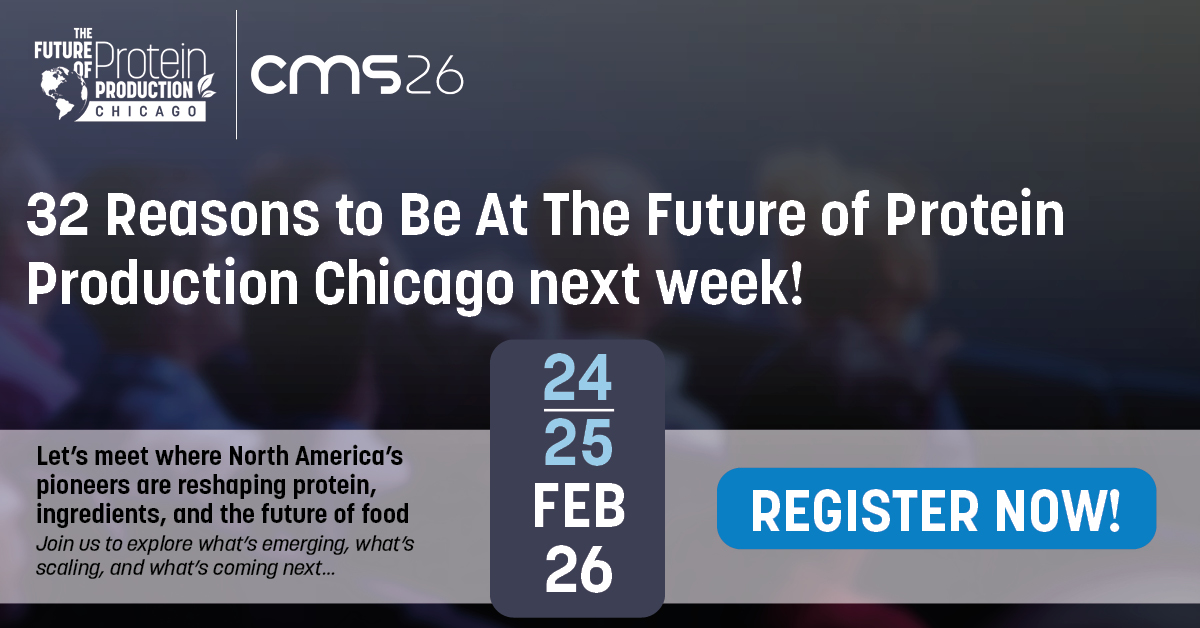

FPP Chicago Speaker Interview: David Ziskind, Market Lead, Food & Beverage, Stantec
A popular speaker at industry events due to his warm presentation of valuable insights, we are delighted that David Ziskind will be joining us in Chicago to tackle scaleup from an engineering perspective
Engineers often prove to be the enabling force in growing a new protein product from a lab-scale concept to a commercial-scale equivalent. When an alternative protein startup is ready to make the leap into manufacture at a mass scale, it’s the engineering systems and design that are among the most critical factors in determining success. Yet, given the technology at play here, company founders are more likely to be scientists, academics, or even just lay people with brilliant ideas. Therefore, seeking independent assistance on the engineering side is invaluable. It’s unsurprising, then, that David Ziskind – whose array of engineering experience covers electrical engineering through to automation – is a very busy man of late.
In his role of Market Lead, Food & Beverage at engineering consultant, Stantec, Ziskind spends a great deal of time working on the very subject of his presentation in Chicago, ‘The road to commercialization: critical engineering and design considerations for manufacturing at commercial scale’. Ziskind describes the key tenets of his approach thusly. “In short, it’s about looking at facility and commercial implications when contemplating manufacturing at commercial scale. These span everything from the economics of a factory to asking, ‘What exactly does it take to build a food plant?’ It’s also about what things to consider when working with an engineering team, and the overall engineering/design process.”
When asked about the biggest technical challenges to manufacturing alternative proteins, Ziskind explains that this is a particularly tough sector due to such a breadth of disparate hurdles to overcome. “A lot of smart people are working on pure technical challenges, and I’m confident, in time, will uncover the solutions,” he comments.
“Challenges persist in infrastructure – addressing macro needs such as utilities (water, wastewater, electricity, etc) but also facility infrastructure (things such as process water, clean steam, chiller, etc). Those things may seem mundane, but they are necessary, and can add considerable expense. Scaling up is a challenge we see across almost all alt proteins products – particularly trying to plan a future facility while still testing and developing a process.”
Scaling up is a challenge we see across almost all alt proteins products – particularly trying to plan a future facility while still testing and developing a process
In terms of how Stantec can assist its customers in overcoming these challenges, Ziskind says, “Our purpose is to create communities and design with community in mind. Our team is inspired by the impact on communities we serve, and certainly sustainability is at the forefront of that. Specific to manufacturing, and even more specifically, food and alternative proteins, we are focused on incorporating crucial elements – including safety, sustainability, and constructability – by design. We have a comprehensive team that can serve any stage of a project, and practically any discipline. It is our ‘fit-for-use’ approach that ensures no matter the process, no matter the technology, we can design the facility and systems to make it happen.”
Regardless of the type of end product, Ziskind says it’s this design stage – and getting things right here – that is critical. “Early and continued discussions on scope, cost, and schedule help ensure success of a project,” he details. “It is that early engagement that enables all parties to address issues on cost and approach. Plant-based proteins have an edge, in that they’ve been around longer and can (generally, to some extent) leverage existing equipment and facilities. They have also been produced at scale, so the industry has benefitted from a number of learnings. To address cost and scalability in cultivated meat production, I believe we need to see large-scale facilities.”
Ziskind observes that cultivated meat firms also have some decisions to take that are specific to these products. “Is scale-up or scale-out the right approach? The first movers will be paving the path and unlocking the industry for future growth. And those first facilities could uncover some additional challenges to be addressed,” he rightly notes.
Naturally, Ziskind and the team at Stantec will be on-hand to help tackle any new challenges that emerge. But what about new engineering innovations? Can Ziskind share any predictions on this front? “I don’t see any particular innovation being the one thing that makes the difference,” he feels. “Rather, it’s going to be a combination of new innovations, repurposing existing ones, and some broader societal movement in sustainability, infrastructure, etc, that ultimately makes a difference in this sector. Most important will be applications of the innovations at a large scale – that is when things will really take off!”
And Ziskind reports great confidence that this large-scale manufacturing of various emerging alternative protein products will happen. “There are major changes occurring in the food system – from what consumers want and focus on, to addressing sustainability, supply chain, and resource availability. I am excited to play a small part in helping ensure the continued development, safety, and security of our global food supply.”
David will be giving a presentation at The Future of Protein Production Chicago called, ‘Commercialization roadmap: Critical considerations for manufacturing at commercial scale', which takes place at McCormick Place on 24/25 April 2024. Book your tickets today to come and hear a further +85 speakers, 30 presentations, eight panel discussions and network with +400 other attendees. Click here
If you have any questions or would like to get in touch with us, please email info@futureofproteinproduction.com

.png)






